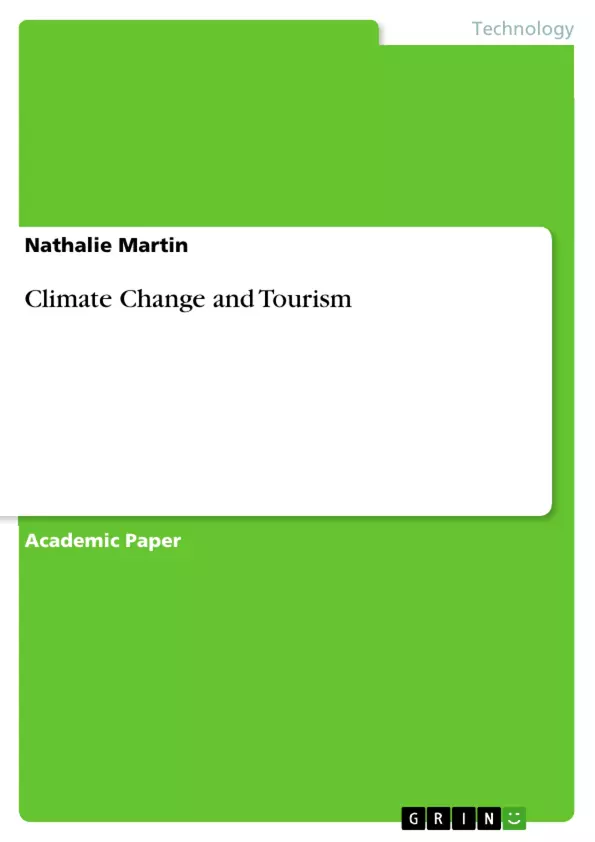In this paper, the scientific background of the greenhouse effect, which is decisive for climate change, is presented. Furthermore, tourism and its importance as an economic factor is reported. As an exemplary study of the interaction between climate change and tourism, those will be explained using two areas that are particularly sensitive: the Maldives archipelago and the Alpine region. For each of these two examples, the initial situation, the problem, is explained and subsequently possible solutions or solution approaches are presented and critically questioned. Due to the business context, little attention is paid to political or ethical issues.
In 2019 there was almost no other global issue as present and polarising as climate change. Starting with many movements, such as "Fridays for Future", the public was increasingly made aware of the topic. The topic has also become increasingly relevant politically. As early with the 2015 UN Climate Conference, important points were set to reduce global warming. Many areas and economic sectors are already affected by climate change and many will con-tinue to feel the effects of climate change in the future.
Inhaltsverzeichnis (Table of Contents)
- 1 Introduction
- 2 Climate Change and Greenhouse Effect
- 2.1 The Greenhouse Effect - Scientific Background
- 2.2 The Anthropogenic Greenhouse Effect
- 2.3 Consequences of the Greenhouse Effect
- 3 The Impacts of Tourism
- 3.1 Economic Impacts
- 3.2 Overtourism
- 4 The Impacts of Climate Change on Tourism and vice versa
- 4.1 Maldives
- 4.1.1 The Problem
- 4.1.2 Possible Solutions
- 4.2 The Alps
- 4.2.1 The Problem
- 4.2.2 Possible Solutions
- 5 Conclusion
- 6 References
Zielsetzung und Themenschwerpunkte (Objectives and Key Themes)
This seminar paper aims to demonstrate the clear connection between climate change and tourism, illustrate this connection with specific examples, and assess the potential effects on consumers.
- The scientific background of the greenhouse effect and its relationship to climate change.
- The impact of tourism as an economic factor.
- The consequences of climate change on tourism, specifically in the Maldives and the Alps.
- Possible solutions and strategies to mitigate the effects of climate change on tourism.
- The potential effects of these changes on tourists and consumers.
Zusammenfassung der Kapitel (Chapter Summaries)
The paper begins by introducing the current relevance and public awareness of climate change, highlighting the importance of its impact on various economic sectors, including tourism. It then delves into the scientific background of the greenhouse effect, explaining its role in driving climate change. Following this, the paper explores the significance of tourism as an economic driver, focusing on its economic impacts and the challenges posed by overtourism.
The main focus of the paper lies in analyzing the interaction between climate change and tourism, using the examples of the Maldives and the Alps. Each region's specific challenges and potential solutions are discussed, emphasizing the need for sustainable practices and adaptation strategies to mitigate the effects of climate change.
Schlüsselwörter (Keywords)
The paper focuses on climate change, tourism, greenhouse effect, Maldives, Alps, economic impacts, overtourism, sustainable tourism, adaptation strategies, and consumer behaviour.
Frequently Asked Questions
How does climate change affect the Maldives?
The Maldives are highly sensitive to rising sea levels caused by the greenhouse effect, which threatens the archipelago's existence and its vital tourism industry.
What are the impacts of climate change on Alpine tourism?
In the Alps, rising temperatures lead to shorter ski seasons and melting glaciers, forcing the region to find new sustainable solutions for year-round tourism.
What is the scientific background of the greenhouse effect?
The paper explains the natural greenhouse effect and the anthropogenic (human-made) greenhouse effect, which leads to global warming.
What is "Overtourism"?
Overtourism refers to the phenomenon where too many visitors at a destination lead to negative impacts on the environment and the quality of life for locals.
How can tourism adapt to climate change?
Possible solutions include sustainable travel practices, diversification of tourism offers, and adaptation strategies to mitigate environmental damage.
- Arbeit zitieren
- Nathalie Martin (Autor:in), 2020, Climate Change and Tourism, München, GRIN Verlag, https://www.grin.com/document/540398



